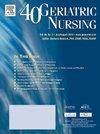Unveiling the interplay between knowledge, self-efficacy, and pro-environmental behavior about climate change in a sample of rural community-dwelling older adults: A national correlational study
IF 2.5
3区 医学
Q3 GERIATRICS & GERONTOLOGY
引用次数: 0
Abstract
Background
Climate change is a global health concern that affects all of humanity, but it disproportionately impacts older adults, particularly those living in rural communities. Older adults lack the ability to actively engage in pro-environmental actions aimed at adapting to and mitigating the harmful effects of climate change.
Aim
To investigate the relationship between knowledge, self-efficacy, and pro-environmental behavior regarding climate change, as well as to identify the factors that predict pro-environmental behavior in a sample of rural community-dwelling older adults.
Methods
A descriptive correlational research design was used with a convenience sample of 517 older adults aged 60 and above, who were recruited from the post offices of the National Post Authority in Minya Governorate, Egypt. Data were collected using a socio-demographic questionnaire, a Climate Change Knowledge Questionnaire, the Environmental Self-Efficacy Scale (ESE), and the Pro-Environmental Behavior Scale (PEBS).
Results
A highly statistically significant positive relationship between climate change knowledge, environmental self-efficacy and pro-environmental behavior (r = 0.412, P=.000; r = 0.392, P=.000 & r = 0.720, P=.000 respectively) was reported. As well as, climate change knowledge and environmental self-efficacy were predictors of high pro-environmental behavior scores (P=.00, R = 0.785; R2=0.617; Adjusted R2=0.615; F = 413.289).
Conclusion
Integrating climate change education into Egypt's sustainable development goals is essential for fostering older adults' environmental self-efficacy, which in turn promotes climate change activism among older people in rural communities.
求助全文
约1分钟内获得全文
求助全文
来源期刊

Geriatric Nursing
医学-护理
CiteScore
3.80
自引率
7.40%
发文量
257
审稿时长
>12 weeks
期刊介绍:
Geriatric Nursing is a comprehensive source for clinical information and management advice relating to the care of older adults. The journal''s peer-reviewed articles report the latest developments in the management of acute and chronic disorders and provide practical advice on care of older adults across the long term continuum. Geriatric Nursing addresses current issues related to drugs, advance directives, staff development and management, legal issues, client and caregiver education, infection control, and other topics. The journal is written specifically for nurses and nurse practitioners who work with older adults in any care setting.
 求助内容:
求助内容: 应助结果提醒方式:
应助结果提醒方式:


